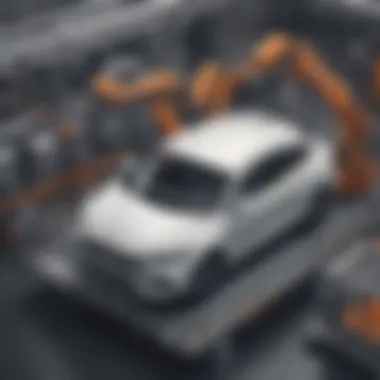The Impact of Car Manufacturing Jobs on Tech Industry Advancements


Tech Trend Analysis
Car manufacturing jobs have historically held a significant impact on the tech industry, shaping trends that reverberate across various sectors. The interplay between advancements in manufacturing processes and technology innovations continues to evolve in fascinating ways, driving a wave of change in both industries. This section will delve into the current trends stemming from the relationship between car manufacturing jobs and the tech sector, analyzing their implications for consumers and offering insightful future predictions and possibilities.
Product Reviews
While the direct correlation between car manufacturing jobs and product reviews may not be immediately apparent, the ripple effects of technological advancements in manufacturing are felt across product landscapes. By examining the products that emerge as a result of these advancements, we can gain valuable insights into the features, specifications, performance, pros, and cons of tech innovations influenced by the evolution of manufacturing processes. This section will provide in-depth analysis and recommendations based on real-world examples.
How-To Guides
Innovations in car manufacturing jobs often lead to shifts in industrial processes that ultimately require industry professionals to adapt and acquire new skills. This section serves as a practical guide for individuals looking to understand the nuances of technological advancements driven by changes in manufacturing practices. From introductory overviews to step-by-step instructions, valuable tips, and tricks, this segment will equip readers with the knowledge needed to navigate the evolving landscape of car manufacturing jobs and their impact on the tech industry.
Industry Updates
Staying abreast of recent developments in both the tech and manufacturing sectors is crucial for professionals and enthusiasts alike. By exploring the latest trends and market insights, this section will offer a nuanced analysis of how industry updates are influencing businesses and consumers. From disruptive technologies to emerging market patterns, this segment will provide a comprehensive overview of the ever-evolving landscape shaped by the intricate relationship between car manufacturing jobs and the tech industry.
Introduction
Car manufacturing jobs have long served as a cornerstone of the industrial landscape, influencing not only the automotive sector but also resonating deeply within the technological realm. This article undertakes a meticulous exploration of the symbiotic relationship between car manufacturing roles and the ever-evolving tech industry. By delving into the profound impact of manufacturing advancements on technological innovations, we unravel the intricate web linking these seemingly different domains.
Significance of Car Manufacturing
Historical Context
The historical backdrop of car manufacturing is rich with pivotal moments that have shaped industrial practices globally. From the early assembly lines of Henry Ford to the innovations of Toyota's Just-In-Time production, history provides a roadmap of advancements that have set the stage for modern manufacturing techniques. Unpacking these historical narratives not only offers insights into past methodologies but also demonstrates how such legacies influence present-day production strategies within the tech landscape.
Technological Evolution
The evolution of technology within the arena of car manufacturing signifies a paradigm shift towards automation, precision engineering, and digitization. These technological strides have not only optimized production processes but have also catalyzed advancements in robotics, artificial intelligence, and data analytics. Understanding the trajectory of technological evolution sheds light on the disruptive forces that continue to redefine the manufacturing-tech interface, steering industries towards unprecedented efficiencies.


Economic Implications
Economically, the nexus between car manufacturing and technology transcends mere productivity gains, extending into realms of global trade, supply chain resilience, and market competitiveness. The economic implications of integrating tech within manufacturing span from cost optimizations through automation to fostering innovation ecosystems that drive economic growth. Acknowledging these economic ramifications underscores the pivotal role of technology in augmenting traditional manufacturing sectors towards sustainable economic prosperity.
Emergence of Tech Integration
Automation in Manufacturing
Automation's integration into manufacturing processes represents a pivotal paradigm shift that streamlines production, optimizes resource allocation, and enhances output quality. The marriage of automation with car manufacturing not only accelerates assembly line processes but also ensures precision engineering, reducing human error while maximizing operational efficiencies. Embracing automation heralds a new era of manufacturing digitization that transcends conventional operational limitations.
Adaptation in Job Roles
In this article, the focus is on understanding the critical aspect of adaptation in job roles amidst the symbiotic relationship between car manufacturing and the tech industry. As technology continues to transform the manufacturing landscape, the role requirements for employees have evolved significantly. The adaptation in job roles encompasses a shift towards embracing technological advancements, automation, and data-driven decision-making processes to stay competitive in an ever-changing industry. This adaptation is essential for employees to remain relevant and valuable in a tech-driven manufacturing environment. Leveraging tech integration ensures efficient production processes and innovative product development, highlighting the importance of adapting job roles to meet the demands of the evolving industry.
Shift in Skill Requirements
Tech Proficiency:
Tech proficiency plays a pivotal role in shaping the future of manufacturing jobs within the tech industry. In this context, tech proficiency refers to the ability to understand and leverage advanced technologies, software, and digital tools to optimize manufacturing processes. Employees with high tech proficiency are adept at operating complex machinery, analyzing data using software tools, and troubleshooting technological issues efficiently. This skill is crucial in ensuring smooth operations, enhancing productivity, and driving innovation within the manufacturing sector. While tech proficiency offers numerous advantages, such as streamlining processes and reducing manual errors, it also introduces challenges such as the need for continuous upskilling to keep pace with technological advancements.
Problem-Solving Skills:
Problem-solving skills are indispensable in the realm of tech-integrated manufacturing jobs. Employees possessing strong problem-solving skills excel in identifying and resolving issues promptly to prevent disruptions in production. These individuals exhibit a proactive approach to handling challenges, critically analyzing situations, and implementing effective solutions to enhance operational efficiency. Problem-solving skills contribute significantly to mitigating downtime, optimizing resources, and fostering a culture of innovation within manufacturing companies. Despite being a valued competency, honing problem-solving skills requires consistent practice and exposure to diverse manufacturing scenarios to effectively navigate complexities in a tech-driven work environment.
Adaptability to Automation:
Adaptability to automation is a key trait that distinguishes successful employees in the tech-infused manufacturing landscape. The ability to adapt to automated processes, machines, and systems is essential for maximizing efficiency and productivity in manufacturing operations. Employees who embrace automation showcase flexibility in integrating new technologies, acquiring new skills, and adapting to changing work dynamics. By being adaptable to automation, individuals can optimize their performance, operate seamlessly alongside advanced machinery, and drive continuous improvements in manufacturing processes. However, while adaptability to automation offers advantages such as increased output and quality control, it also necessitates constant learning and adjustment to keep pace with technological innovations in the manufacturing industry.
Training and Development
Upskilling Programs:


Upskilling programs play a pivotal role in preparing the workforce for the technological transformations occurring in the manufacturing sector. These programs focus on enhancing employees' existing skills, introducing them to new technologies, and equipping them with the knowledge needed to operate efficiently in a tech-centric environment. Upskilling programs offer employees the opportunity to expand their competencies, stay abreast of industry trends, and remain valuable assets within their organizations. Organizations that invest in upskilling programs foster a culture of continuous learning, innovation, and adaptability, thus ensuring a skilled workforce capable of leveraging technology to drive business growth.
Reskilling Initiatives:
Reskilling initiatives are imperative in addressing skill gaps and preparing employees for emerging roles in tech-based manufacturing settings. These initiatives involve retraining employees to acquire new competencies, transition into different roles, or master advanced technologies relevant to their field. By implementing reskilling initiatives, organizations can enhance employee versatility, capitalize on emerging tech opportunities, and future-proof their workforce against evolving industry demands. Reskilling initiatives facilitate employee growth, promote internal mobility, and empower individuals to embrace change and innovation with confidence. While reskilling initiatives offer benefits such as improved employee retention and competitiveness, they require strategic planning and tailored training programs to align with the organization's goals and foster a culture of continuous development.
Implications on Workforce
In the realm of technological advancements, the implications on the workforce serve as a critical focal point within the context of the intricate relationship between car manufacturing jobs and the tech industry. Understanding the implications on the workforce entails delving into the shifting dynamics of employment structures, skill demands, and the overarching impact on individuals engaged in these sectors. It is imperative to dissect the multifaceted facets of workforce implications to navigate the evolving landscape of work spurred by technological metamorphosis.
Job Displacement Concerns
Automation Effects
Automation effects represent a pivotal aspect of the discussion regarding the implications on the workforce. The integration of automated technologies in manufacturing processes has reshaped traditional job roles, leading to concerns regarding workforce displacement. This transformative shift towards automation in car manufacturing emphasizes the need to explore its effects comprehensively. Delving deeper into automation effects unveils the intricate balance between efficiency gains and potential job redundancies. Understanding the nuances of how automation influences workforce dynamics offers valuable insights into the contemporary challenges and opportunities in the tech-infused manufacturing realm.
Reskilling Opportunities
Equally vital in the discourse on implications for the workforce are reskilling opportunities. As automation disrupts conventional job structures, the necessity for upskilling and reskilling becomes evident. Reskilling initiatives play a pivotal role in empowering the current workforce to adapt to the evolving demands of technology-driven industries. Recognizing the significance of reskilling opportunities sheds light on the crucial strategies aimed at mitigating potential job displacements and fostering a skilled workforce equipped to harness the benefits of technological advancements.
Future Job Prospects
Exploring future job prospects unveils a tapestry of opportunities and challenges influenced by the convergence of car manufacturing jobs and technological advancements within the tech industry.
Emerging Tech Roles
The emergence of new tech roles signifies a transformative phase in employment trends shaped by advancements in manufacturing technologies. With the proliferation of automation, artificial intelligence, and data analytics, new job roles are on the rise in the tech sector. Understanding the landscape of emerging tech roles delves into the specialized skills required, the integration of cutting-edge technologies, and the demand for a tech-savvy workforce to navigate this evolving terrain effectively.
Innovation-driven Employment
Innovation-driven employment encapsulates the essence of progressive career opportunities arising from the synthesis of car manufacturing jobs and tech innovation. Emphasizing innovation-driven employment underscores the pivotal role of creativity, problem-solving, and technological acumen in driving industry growth. Exploring the evolution of employment paradigms towards innovation-driven roles showcases the future prospects for individuals seeking dynamic and intellectually stimulating careers within the tech-infused manufacturing ecosystem.


Collaboration between Industries
Collaboration between industries is a pivotal aspect within the context of the dynamic relationship between car manufacturing jobs and the tech industry. This partnership holds substantial importance in fostering innovation, knowledge sharing, and technological advancements. By integrating expertise from both the manufacturing and tech sectors, organizations can leverage diverse skill sets and resources to drive progress. The collaboration between industries also cultivates a symbiotic ecosystem where ideas flow freely, leading to groundbreaking developments that benefit both sectors.
Tech and Manufacturing Synergy
Cross-Sector Partnerships:
Cross-Sector Partnerships play a crucial role in enhancing the synergy between technology and manufacturing. These partnerships entail the pooling of resources, capabilities, and insights from distinct industries to achieve common objectives. The key characteristic of Cross-Sector Partnerships lies in the convergence of expertise, allowing for the fusion of technological innovations with manufacturing processes. This collaboration is a favorable choice for this article as it enables a comprehensive exploration of how technology integration impacts car manufacturing jobs. The unique feature of Cross-Sector Partnerships is the holistic approach towards problem-solving, addressing challenges through interdisciplinary collaboration. While advantageous in encouraging innovation and efficiency, these partnerships may pose challenges in aligning different organizational cultures and objectives within the context of this article.
Knowledge Exchange:
Knowledge Exchange stands as a crucial component in bridging the gap between the tech and manufacturing sectors. This aspect involves the sharing of insights, best practices, and discoveries to facilitate mutual growth and learning. The key characteristic of Knowledge Exchange is its role in fostering a culture of continuous improvement and innovation within industries. In the scope of this article, Knowledge Exchange is a valuable choice as it elucidates how information exchange influences technological advancements in car manufacturing. The unique feature of Knowledge Exchange lies in its ability to spark creativity and enhance problem-solving skills through the amalgamation of diverse knowledge pools. While advantageous in promoting collaboration and learning, challenges may arise in ensuring the relevance and accuracy of exchanged information within the narrative of this article.
Innovation Ecosystem
Research Collaborations:
Research Collaborations play a pivotal role in driving innovation and progress within the tech and manufacturing domains. These collaborations involve joint research efforts aimed at developing new technologies, processes, and products. The key characteristic of Research Collaborations is the synergy created through shared expertise, resources, and objectives, leading to impactful outcomes. Within this article, Research Collaborations are a beneficial choice as they showcase how joint research initiatives influence the evolution of manufacturing technologies in response to tech advancements. The unique feature of Research Collaborations is their potential to accelerate innovation cycles and drive industry-wide transformation. Despite offering significant advantages in knowledge creation and technology development, challenges may arise in coordinating research efforts and managing intellectual property rights within the narrative of this article.
Product Development:
Product Development plays a vital role in the convergence of technology and manufacturing processes to bring innovative solutions to market. This aspect focuses on designing, optimizing, and commercializing products that cater to evolving consumer demands and technological trends. The key characteristic of Product Development is its emphasis on translating technological innovations into tangible products that enhance operational efficiency and user experience. In the context of this article, Product Development is a preferred choice as it outlines how product innovation and adaptation shape the landscape of car manufacturing jobs within the tech industry. The unique feature of Product Development lies in its iterative nature, where constant feedback and iteration drive continuous improvement and customer satisfaction. While advantageous in fostering competitiveness and market relevance, challenges may arise in aligning product development strategies with rapidly evolving tech advancements within the narrative of this article.
Conclusion
In analyzing the intricate relationship between car manufacturing jobs and the tech industry, the conclusion drawn emphasizes the critical importance of balancing tradition with innovation. This delicate equilibrium serves as the cornerstone for sustainable growth and progress within the evolving landscape of technology and manufacturing. By striking a harmonious balance between traditional practices and cutting-edge innovations, industries can harness the best of both worlds, leveraging established foundations while embracing transformative technologies. This strategic fusion not only fosters continuity but also drives innovation, propelling the industry towards a more robust and dynamic future.
Future Outlook
Balancing Tradition and Innovation
Delving deeper into the aspect of balancing tradition and innovation unveils a pivotal element that underpins the symbiotic relationship between car manufacturing and the tech sector. This integration of time-tested methods with avant-garde technologies forms the crux of sustainable development and innovation. The key characteristic of this balance lies in its ability to preserve industry heritage while catalyzing progress through technological advancements. Its unique feature lies in the fusion of legacy practices with futuristic solutions, blending experience with experimentation to yield unparalleled outcomes within the realm of car manufacturing jobs and technology. Although there are challenges in navigating this dual landscape, the advantages far outweigh the disadvantages, as it ensures a steady evolution while nurturing a culture of innovation and adaptability.
Sustainable Growth Strategies
Turning attention to sustainable growth strategies, the focus shifts towards cultivating long-term prosperity in the convergence of car manufacturing jobs and the tech industry. This strategic approach emphasizes continuity and longevity, steering organizations towards stability and resilience amid rapidly changing technological paradigms. The key characteristic of sustainable growth strategies lies in their ability to foster sustainable practices, driving environmental stewardship, social responsibility, and economic viability. This intentional and holistic framework is a preferred choice for this article, as it aligns with the enduring ethos of creating lasting value while minimizing negative impacts. The unique feature of sustainable growth strategies lies in their capacity to future-proof operations, balancing profit with purpose to ensure sustainable success in the interconnected domains of car manufacturing and technology. Despite challenges in implementation and short-term gains, the long-term benefits outweigh any initial hurdles, paving the way for a more sustainable and prosperous future in both industries.



